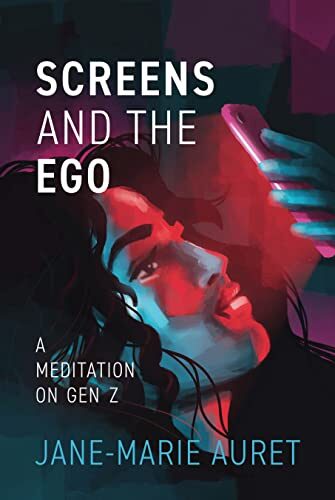A Personal and Deeply Affecting Meditation on Modernity and the Soul
From the first page of “Screens and the Ego,” I knew it was going to be a special book. And by the time I’d finished the last page, not only was I proven right, but I was left with the distinct feeling I’d just read something important.
“Screens and the Ego” is easily one of the most personal and purposeful books I’ve ever read. Author Jane-Marie Auret has crafted a truly unique anthology of stories, musings, and introspective reflections centering around a central topic: the effects of the modern world on the lives, beliefs, morals, and mental/spiritual health of Gen Z. Part prose fiction, part semi-autobiography, and part philosophical pontification, this book covers a lot of ground in less than 200 pages, and covers it exceptionally well.
As with any good anthology, the stories/chapters in “Screens and the Ego” are an eclectic bunch, but stand united in their broad subject matter and overall purpose. Some are short fiction, while others recount personal observations from the author. Some dive into deep philosophical territory on topics including freedom, history, and religion. One is a poem. But the purpose of each is the same: to illuminate the confusion, trauma, skewed ethics, and overall lost nature of a generation raised by phone screens and social media. I won’t spoil any specifics here, but rest assured: each of these stories is great for different reasons, and there’s not a dud in the bunch.
Diving into the various struggles of Gen Z isn’t new territory, but the approach found in “Screens and the Ego” is unlike anything this reviewer has encountered. The combination of different storytelling structures and writing styles allows Auret to approach multiple topics from a variety of angles. Whether she’s telling the tragic story of a young woman driven to attention-seeking attempts at suicide (the titular “Screens and the Ego” story from which the book draws its name) or recounting her own experiences as a cancer survivor (“Isopropyl Alcohol”), the author pours both passion and intention into every tale and how it’s told. This multi-faceted approach lends the book a kinetic energy that feels appropriately reflective of the subjects it tackles.
The writing itself is also strong, characterized by short, to-the-point sentences and dramatic moments that make each tale, character, and emotion feel real and visceral. There’s a refreshing rawness to the way Auret writes her stories and thoughts; a tremendous amount of emotion is packed into every sentence and word choice. This is a book you feel as you read it, with every line of dialogue, reflection, and observation hitting hard and taking no prisoners.
This feeling of really “going there” extends beyond the prose style and very much describes the content of the book itself. Make no mistake: this is a book that pulls exactly zero punches. Topics ranging from suicide and self-harm to domestic violence, abuse, drug addiction, manipulation, and serious mental illness are delved into without hesitation, presented with matter-of-fact, often painful honesty. Thankfully, none of this heavy subject matter comes across as gratuitous or simply there for substance-devoid shock value. The power of this book lies in how unafraid it is to tackle these subjects head on, and the fearlessness on display is highly commendable.
Another important aspect of the book is just how deeply personal it is. “Screens and the Ego” wears its purpose and soul on its sleeve, and much of that comes from the soul and mind behind it. Much of the book (including some of its most heartbreaking parts) is derived from the author’s life, as are its pontifications on life, politics, religion, and various social issues. While your mileage on these topics may vary, their inclusion here is driven by deep personal beliefs, observations, and even trauma. It’s clear that Auret’s intention with this book is to help people, connect with them, and shed light on critical issues affecting her generation. You may not agree with every observation or opinion, but the compassion behind them is clear.
At its heart, “Screens and the Ego” is a sobering snapshot of a moment in time, and of a generation crippled by clouded judgement and omnipresent online influence. It’s a book with a mission, unafraid to shed light on difficult issues and brave enough to speak truth to power. While its perspective is uniquely born from the author’s specific life events and beliefs, its messages are universal and its subjects – while not for the faint of heart – are important to consider.
Perhaps you’ve witnessed some of the same unfortunate experiences described in this book. Perhaps some of those things have happened to you. Whatever the case, it is my belief that anyone with an empathetic heart and an open, introspective mind will find this book as powerful, thought-provoking, and important as I did.
Views: 41




